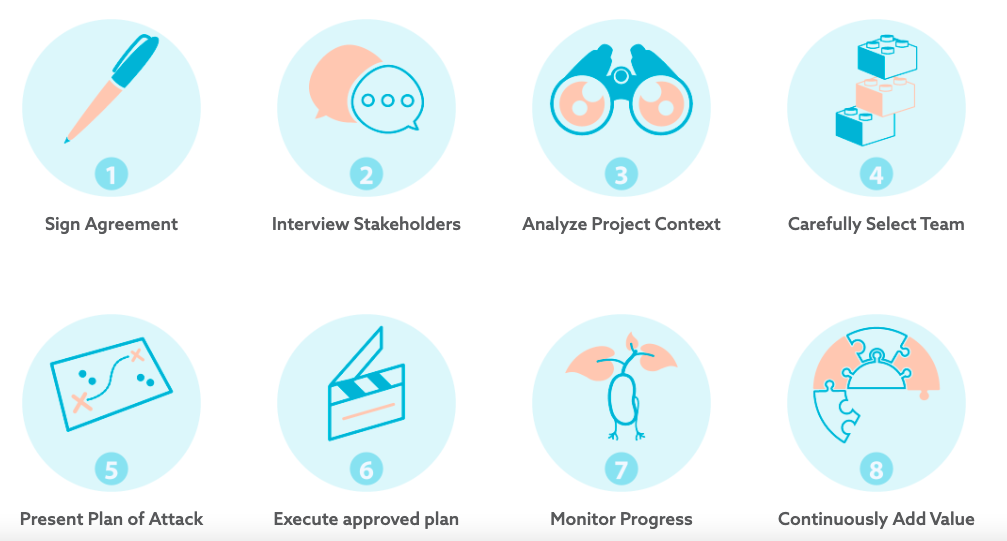How to Hire an Offshore QA Team
How to Hire an Offshore QA Team
Finding the correct QA (Quality Assurance) team can take time and effort. Not only do you need a team with the skills and experience to do the job well, but you also need one compatible with your company culture. And then there’s the cost factor: hiring an in-house QA team can be prohibitively expensive.
According to Salary.com, the average hourly wage for an In House Quality Assurance Engineer in the United States is between $39 and $43. Still, the actual cost could be approximately $55, including operating overhead expenses and taxes. (If you want to learn more about the true cost of hiring a QA engineer, you can check out here)
But let’s start by providing some context about what an offshore team means.
While outsourcing happens within a country’s borders, it’s not unheard of for companies to distribute the workload across the globe— this is called offshoring. There are thousands of companies worldwide that solely deal with offshoring, with a large number of them established in developing countries.
For example, Latin America is known for the possibility of offshoring IT and software services offshoring. Many companies are tending to customer service and conflict resolution departments for companies such as Samsung, to name one.

That’s where offshore QA teams come in. Offshore teams offer all the benefits of an in-house team – including access to experienced professionals – but at a fraction of the cost. So how do you go about finding and hiring an offshore QA team?
Let’s check the following topics that will help you get started.
1. Look for a team with the right mix of skills and experience.
When looking for an offshore QA team, you want to find one with the right mix of skills and experience. That means a team with both technical expertise and industry-specific knowledge. For example, if you’re in the Ed Tech industry, you’ll want a team that understands this specific market.
It’s also wise to look for a team with experience working with companies like yours. For example, if you’re a startup, you’ll want a team familiar with the challenges of testing a company like yours. And if you’re an established company with a specialized software product, you’ll want a team with experience in development like yours.
2. Make sure the team is compatible with your company culture.
It’s essential to find an offshore QA team that is compatible with your company culture. After all, they will be representing your company and your brand. You want to ensure they share your values and will fit your team well.
One way to gauge compatibility is to look at the team’s previous case studies. If they’ve worked with companies in your industry, that’s a good sign. And if they have experience working with companies of similar size and structure to yours, that’s another good indicator.
3. Review the timezone difference.
Consider the time zone difference. For example, if you’re hiring a team in India or Ukraine in the US, you’ll need to consider the timezone difference. And the time of response. Latin American nations could be more accurate, possibly working offshore regarding schedule and rates.
4. Consider the cost.
Offshore QA teams can be a great value, but you still need to consider the cost. Ensure you get quotes from QA outsourcing companies that provide staff augmentation to compare prices.
In addition to the hourly rate, you should ask about different rates to avoid proposals with hidden costs, such as extra fees. And ensure a detailed breakdown of all the costs so you can easily compare quotes.
Try our QA cost comparison calculator, a tool based on verified data showing you the cost of hiring in-house vs. full-time TechAID engineers.
5. Check references.
Remember to check references. It is one of the most critical steps in hiring any team, but it’s crucial when hiring an offshore team. You want to ensure they have a track record of success and are known for delivering quality results. You can look at the LinkedIn reference and directories like Clutch or Google reviews page.
6. Meet the team members before making a decision.
Take a look at the team members’ resumes and schedule a previous interview before making a decision; it will help you know if they meet your company’s expectations, and also you can analyze their communication skills.
7. Sign a mutual agreement.
Finally, sign a contract before you start working with the team or provide information from your company. It will protect you in case of any issue you may have. The contract should outline the scope, the team’s responsibilities, and team hours dedication (full-time or part-time). We suggest creating a free cancelation agreement if the team does not deliver what your company expects.
Hiring an offshore QA team can be a great way to get what you need without breaking the bank. Make sure to follow this checklist and choose a team with the right mix of skills, experience, and compatibility with your company culture and time zone.
With these previous tips in mind, you’ll be well to finding the perfect offshore QA team that fits your expectations.
At TechAID, we provide fully integrated QA teams ready to help you to reduce your operating costs and improve the quality of your products.
Transparency and managing expectation is often a key to integrating. Here is what to expect when you sign with us.

Let’s schedule a free analysis session to discuss how we could help you reduce costs by finding the right QA team.
OTHER POSTS YOU MIGHT LIKE
TechCrunch Disrupt 2023 -Explored the Future of Technology and AI
The hustle and bustle of San Francisco streets, the cutting-edge innovation in the air, and a congregation of tech enthusiasts from around the globe. This encapsulates the vibrancy and excitement of TechCrunch Disrupt 2023. As the technology calendar rolls on, there’s one event that never…
From Isolation to Collaboration: A Software Tester’s Journey
A Software Tester’s Journey As a software tester, I’ve learned that our role extends beyond finding bugs. We are a crucial part of the development team, and our ability to engage positively with developers can significantly impact the success of a project. I learned this…

